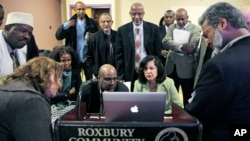The May 20 killing in Maryland of Richard Collins, an African-American college student with a bright future, has been called by some a lynching. Two men in Oregon who died May 26 while defending a black woman and a Muslim woman from verbal abuse have been called heroes.
Those incidents are just the most recent in a rising tide of violent activity attributed to white supremacists.
Christian Picciolini knows why many young people join the "white power" movement. "Identity, community, sense of purpose," he said.
He should know: He helped build a white nationalist group in Chicago in the 1990s known as the Chicago Area Skinheads. He became a skinhead leader and recruiter, even spreading the white supremacist message through music in skinhead punk bands known as White American Youth and Final Solution.
Now, having shed his extremist beliefs and his ties to his white power cohorts, he reaches out to other people seeking to leave the movement, and those tempted to join.
Looking for 'place to belong'
Picciolini helped found the nonprofit organization Life After Hate, which helps individuals, friends and family affected by extremist groups. Former members of those organizations ally themselves with those seeking help. They share their experiences and the lessons they learned, including how to fill the personal needs that Picciolini says are often the real motivation to join a hate group.
Picciolini said recruits to white power groups aren't just drawn in by the ideology. "It's always because 'I wanted some place to belong,' " he said.
He knows this because it was his own experience and because, by his own estimate, he's talked with nearly 1,000 other people about their experiences with extremist groups. He said one of the most important parts of the rehabilitation process, when helping a person change the way he thinks about the object of his prejudice, is one-on-one contact with a member of the group he thought he hated.
"That's usually when the magic happens," Picciolini said, "when people realize that the vision in their head, that the fear that they had, doesn't match reality."
Helping people fill personal needs doesn't always sound like a viable way to fight extremism. But last year, the Obama administration took a chance on it, allotting $10 million in grants to groups that aim to stop extremists through prevention and personal intervention, a process dubbed Countering Violent Extremism.
Picciolini's group found out in January, just a few days before the new president was inaugurated, that Life After Hate had been given a $400,000 grant to develop an online way to reach out to teens at risk of joining extremist groups. The idea was to hook those teens up with former members of violent extremist groups who grew disillusioned, dropped out and now are ideal counselors for at-risk youth who are reaching the same crossroads.
Silence on funds
Although the grants were supposed to be disbursed within 30 days of the announcement of the winners, there has been no official word from the Trump administration on when or whether those funds will appear in mailboxes. Several groups, Life After Hate among them, have said publicly that they have heard nothing more about whether to expect the money.
The Reuters news agency published a story in February quoting sources in the Trump administration as saying the Countering Violent Extremism funding might be rerouted to programs focused solely on overseas groups such as Islamic State. (The program falls under the Department of Homeland Security, which has not answered repeated VOA requests for comment.)
But a study by the George Washington University's program on extremism says the number of white nationalists and self-identified Nazi sympathizers on Twitter has multiplied more than 600 percent since 2012.
The study says Twitter announced in August that it had shut down 360,000 accounts for promoting terrorism in its crackdown on IS-related material. But white nationalists continue to promote their views "with relative impunity," the study says.
While many experts agree that domestic extremism is a growing problem, not all agree on how to stop it.
Nicole Nguyen, assistant professor of social foundations of education at the University of Illinois-Chicago, told WTTW public television that after studying CVE for more than a year, she didn't think it was a sound policy for public schools.
"There are a lot of alienated and bullied kids in America who don't commit acts of violence," she said last week. "There are tons of devout religious people who never commit violent extremism. So how is it that we're coming to filter out who we think might actually be a terrorist?"
Comparison to profiling
In a column in the magazine Psychology Today, experts Alice LoCicero and Wesley Boyd said last year that CVE programs "include attempts, with no basis in evidence, to predict who might someday become violent due to a passionate investment in a cause."
They, too, argue that attempts to stop extremism before it starts amount to profiling, a practice critics say is both inefficient and harmful to minorities that already face prejudice.
Still, Life After Hate, whose participants self-select, is somewhat different. Nguyen said that while self-selection removes some of the problems with CVE, "Life After Hate is more of an exception than a norm."
While this year's money is in limbo, the Trump budget for fiscal 2018 has wiped out the entire $50 million CVE program at a time when, its supporters argue, the need for preventive and rehabilitative measures is higher than ever.
"Before the election in November, we were getting maybe one to three requests [for help] per week," Picciolini said. "Now, we get one to four requests per day."






